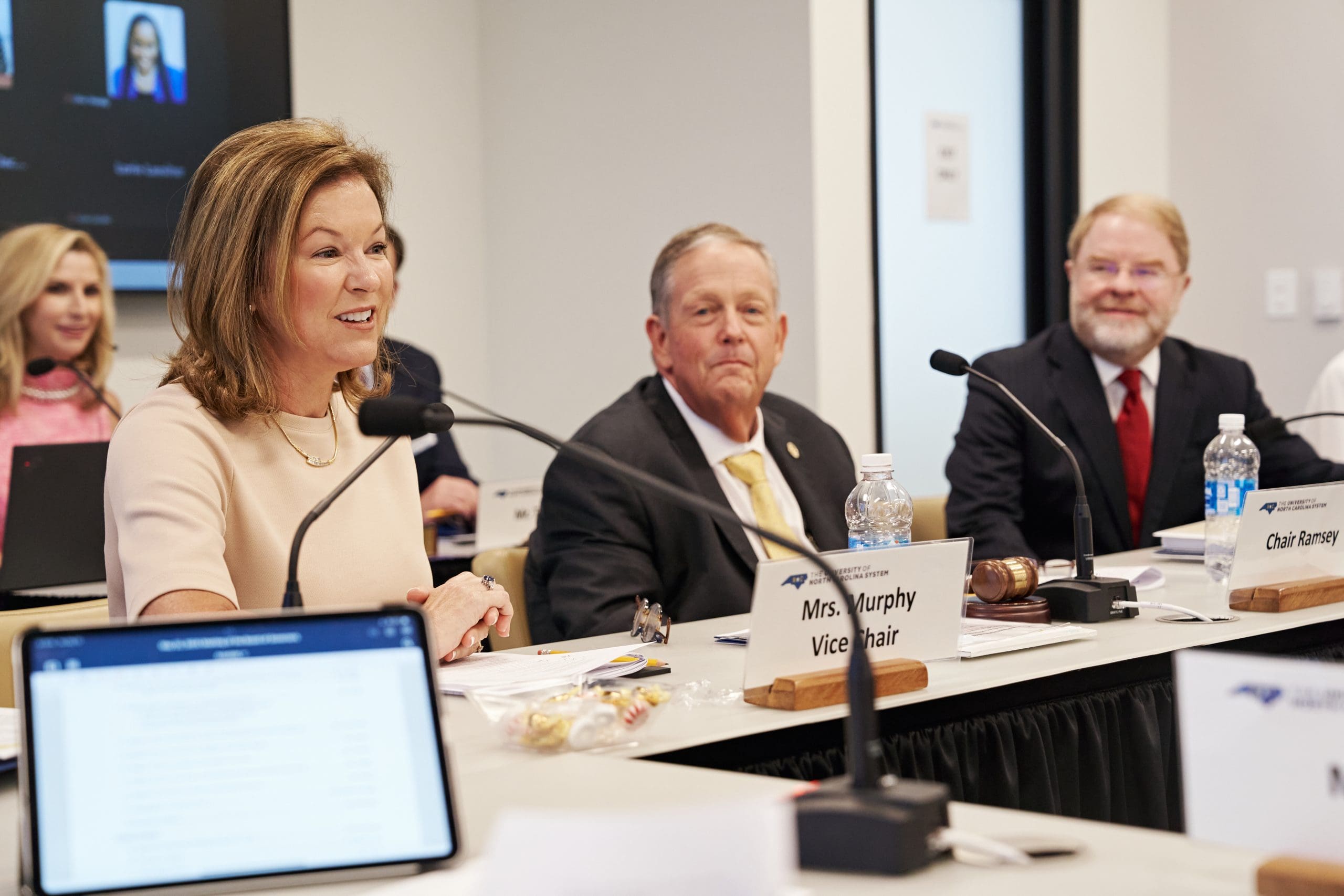ABOUT THE BOARD OF GOVERNORS
The University of North Carolina System is governed by the Board of Governors, which, under Chapter 116 of the North Carolina General Statutes, has responsibility for the planning, development, and overall governance of the UNC System. The Board elects the president of the UNC System.
Board Membership
The Board of Governors has 24 voting members, elected by the Senate and House of Representatives of the North Carolina General Assembly, to staggered four-year terms. Additionally, the president of the UNC Association of Student Governments serves as a nonvoting, ex officio member of the Board. No person may be elected to more than three full four-year terms.
Board Officers

The Board of Governors elects a chair, vice chair, and secretary from among its voting membership for two-year terms beginning on July 1 of even-numbered years. The current officers are:
- Chair: Wendy Floyd Murphy
- Vice Chair: Kellie Hunt Blue
- Secretary: Pearl Burris-Floyd
Chairs of the Board of Governors
- William A. Dees, Jr. (1973-76)
- William A. Johnson (1976-80)
- John R. Jordan, Jr. (1980-84)
- Philip G. Carson (1984-88)
- Robert L. Jones (1988-90)
- Samuel H. Poole (1990-94)
- W. Travis Porter (1994-95)
- D. Samuel Neill (1995-96)
- Joseph E. Thomas (interim July 1996-August 1996)
- C. Clifford Cameron (1996-98)
- Benjamin S. Ruffin (1998-2002)
- J. Bradley Wilson (2002-06)
- Jim W. Phillips, Jr. (2006-08)
- Hannah D. Gage (2008-12)
- Peter D. Hans (2012-14)
- John C. Fennebresque (2014-15)
- W. Louis Bissette (2015-18)
- Harry L. Smith, Jr. (2018-November 2019)
- Randall C. Ramsey (November 2019-June 2024)
Governance
The General Assembly of 1971 created the current governing structure of the University of North Carolina System, including the restructuring of the former Board of Trustees into the present Board of Governors. Since that time, it has been led by 18 chairs, and the System has grown to include 17 constituent institutions and various associated entities.
The UNC Board of Governors is the policy-making body legally charged with the “general determination, control, supervision, management, and governance of all affairs of the constituent institutions.”[i] It elects the president, who administers the University. The 24-voting members of the Board of Governors[ii] are elected by the Senate and House of Representatives for four-year terms. Former Board chairs and Board members who are former governors of North Carolina may continue to serve for limited periods as nonvoting members emeriti.[iii] The president of the UNC Association of Student Governments or that student’s designee is also a nonvoting member.
Each of the 17 constituent institutions is headed by a chancellor who is chosen by the Board of Governors on the president’s nomination and is responsible to the president. Each institution has a board of trustees composed of 13 members,[iv] of eight appointed by the Board of Governors; four appointed by the General Assembly, two of whom shall be appointed upon the recommendation of the President Pro Tempore of the Senate, and two of whom shall be appointed upon the recommendation of the Speaker of the House of Representatives; and the president of the student government of the institution.[v] Each board of trustees holds extensive powers over academic and other operations of its campus on delegation from the Board of Governors.
The Board of Governors maintains The Code and the UNC Policy Manual. The Code incorporates the requirements of the Constitution and General Statutes, as well as Board bylaws and other high-level policies. The UNC Policy Manual provides more specific direction and policies on university matters.
[i] G.S. 116-11(2).
[ii] S.L. 2017-1. In 2017, the General Assembly passed legislation to reduce the number of members of the Board of Governors from 32 to 24 members. The transition was achieved by 12 members being elected in 2017 and every two years thereafter.
[iii] G.S. 116-6 (f) and (g).
[iv] Fifteen trustees in the case of the University of North Carolina School of the Arts (G.S. 116-65). Twenty-seven trustees in the case of the North Carolina School of Science and Mathematics (G.S. 116-233, et seq.).
[v] G.S. 116-31(d).